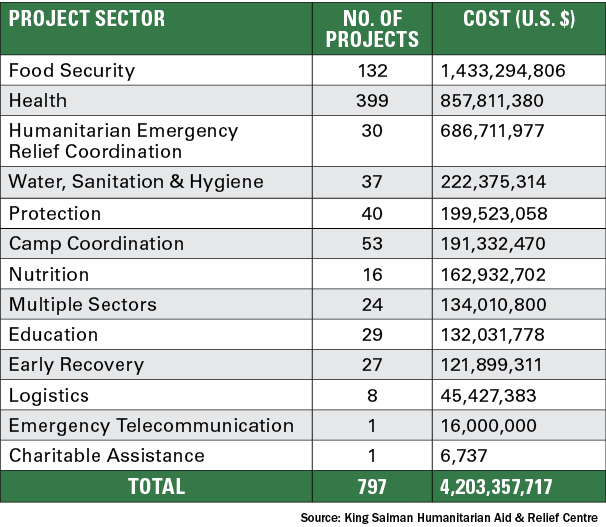Unipath Staff | photos by GENERAL DIRECTORATE OF STRATEGIC COMMUNICATIONS, Saudi Ministry of Defense
Health and medical care for veterans is a pressing demand. This is even more true in post-crisis scenarios. In response to these demands and represented by coalition forces, the Saudi government has built nine hospitals inside Yemen to support the Yemeni Ministry of Health and Population in its role to unconditionally treat the victims of war and any other civilians capable of accessing its services without regard to race, color or creed.
The locations of these hospitals were chosen based on the existing operational profile and an assessment of needs at each site. Hospital sites were chosen and mapped in accordance with the requirements of international and humanitarian law and given the necessary markings as stipulated by the Geneva Conventions and Protocols to facilitate access to the sites. Based on bed capacity, two types of hospitals were chosen: Type A hospitals with a 50-bed capacity and Type B hospitals with a 30-bed capacity.
Overseen by the Saudi Medical Support Center and Joint Forces Command (JFC), these nine hospitals are staffed by 355 personnel from various medical specialties, enabling them to provide humanitarian assistance to Yemenis across various geographic regions.
 Physicians provide care in diverse specialties such as surgery, maternity, gastroenterology, emergency pediatrics, anesthesiology, and family and community medicine. They are supported by nurses who focus on general cases, emergencies and intensive care. Dental care is provided at integrated outpatient clinics. They are all supported by auxiliary staff and technicians who perform laboratory work and assist physicians with radiology, physiotherapy, anesthesiology, surgical technology and childbirth.
Physicians provide care in diverse specialties such as surgery, maternity, gastroenterology, emergency pediatrics, anesthesiology, and family and community medicine. They are supported by nurses who focus on general cases, emergencies and intensive care. Dental care is provided at integrated outpatient clinics. They are all supported by auxiliary staff and technicians who perform laboratory work and assist physicians with radiology, physiotherapy, anesthesiology, surgical technology and childbirth.
To ensure high-quality care for our Yemeni patients, the Medical Support Center and JFC ensured these specializations employ certified and accredited staff.
The program has succeeded in improving Yemeni health care. The Saudi field hospitals in Yemen have served an average of 36,000 outpatients per month. Another 90 patients are admitted to the hospitals each month.
The Houthis’ assault on state sectors has caused an acute shortage of health services in most regions of Yemen, along with a brain drain from areas of conflict. Saudi Arabia, represented by Joint Forces Command and the King Salman Humanitarian Aid and Relief Centre, has provided hospitals and prosthetics centers in addition to medical supplies distributed free of charge to hospitals and medical centers.
Saudi Arabia is also providing treatment grants to send certain cases to medically advanced countries or specialized treatment centers in the kingdom. This included a case of conjoined twins that required the combined efforts of King Abdullah Medical City and National Guard personnel to coordinate, transfer and perform delicate surgery.
The Medical Support Center participates in a handful of volunteer medical activities by hosting volunteer medical teams from the King Salman Humanitarian Aid and Relief Centre throughout Yemen. For example, the Medical Support Center, along with the JFC, organized campaigns for cosmetic surgery and medicine, in addition to campaigns for cardiac and ocular health and related surgeries.

Planning is underway to host volunteer campaigns to raise the general level of health of members of Yemeni society and to promote a good sanitary culture alongside various domestic and foreign partners who will contribute to treatment, prevention and education in the health field, benefit individuals and society, and lead to an improved quality of life.
When we began these health care efforts, Yemenis reacted cautiously at first from a lack of understanding about the objectives of our mission and what we would be providing. But once it became clear that our intentions were good and the services we provided were high quality, Yemenis flocked to our hospitals across the country.
Nevertheless, these round-the-clock medical efforts are insufficient. Yemen requires the generosity and solidarity of the international community to rebuild its health system and ensure justice and equality for all members of the Yemeni social fabric.
The international community also needs to pressure those forces causing the humanitarian disaster and health crisis: the Houthis. These rebels have failed to respect patient rights and robbed Yemeni citizens of the essential requirements of life. The most productive way to help Yemenis is to support health sectors approved or operated by the legitimate government in Yemen. Ensuring the well-being and prosperity of the Yemeni people can only be achieved through credible and reliable channels.
The Kingdom of Saudi Arabia Ministry of Defense contributed information for this article.

